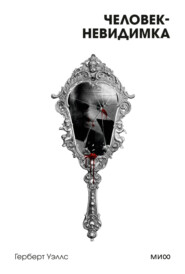По всем вопросам обращайтесь на: info@litportal.ru
(©) 2003-2024.
✖
The Country of the Blind, and Other Stories
Настройки чтения
Размер шрифта
Высота строк
Поля
"I suppose it will wear off?"
I shook my head. "I don't think you can count on that," I said.
And then there was another burst of passion, and he kicked out at adjacent chairs and banged the floor. He behaved just as I should have expected a great, fat, self-indulgent man to behave under trying circumstances – that is to say, very badly. He spoke of me and of my great-grandmother with an utter want of discretion.
"I never asked you to take the stuff," I said.
And generously disregarding the insults he was putting upon me, I sat down in his armchair and began to talk to him in a sober, friendly fashion.
I pointed out to him that this was a trouble he had brought upon himself, and that it had almost an air of poetical justice. He had eaten too much. This he disputed, and for a time we argued the point.
He became noisy and violent, so I desisted from this aspect of his lesson.
"And then," said I, "you committed the sin of euphuism. You called it, not
Fat, which is just and inglorious, but Weight. You – "
He interrupted to say that he recognised all that. What was he to do?
I suggested he should adapt himself to his new conditions. So we came to the really sensible part of the business. I suggested that it would not be difficult for him to learn to walk about on the ceiling with his hands —
"I can't sleep," he said.
But that was no great difficulty. It was quite possible, I pointed out, to make a shake-up under a wire mattress, fasten the under things on with tapes, and have a blanket, sheet, and coverlet to button at the side. He would have to confide in his housekeeper, I said; and after some squabbling he agreed to that. (Afterwards it was quite delightful to see the beautifully matter-of-fact way with which the good lady took all these amazing inversions.) He could have a library ladder in his room, and all his meals could be laid on the top of his bookcase. We also hit on an ingenious device by which he could get to the floor whenever he wanted, which was simply to put the British Encyclopaedia (tenth edition) on the top of his open shelves. He just pulled out a couple of volumes and held on, and down he came. And we agreed there must be iron staples along the skirting, so that he could cling to those whenever he wanted to get about the room on the lower level.
As we got on with the thing I found myself almost keenly interested. It was I who called in the housekeeper and broke matters to her, and it was I chiefly who fixed up the inverted bed. In fact, I spent two whole days at his flat. I am a handy, interfering sort of man with a screw-driver, and I made all sorts of ingenious adaptations for him – ran a wire to bring his bells within reach, turned all his electric lights up instead of down, and so on. The whole affair was extremely curious and interesting to me, and it was delightful to think of Pyecraft like some great, fat blow-fly, crawling about on his ceiling and clambering round the lintel of his doors from one room to another, and never, never, never coming to the club any more…
Then, you know, my fatal ingenuity got the better of me. I was sitting by his fire drinking his whisky, and he was up in his favourite corner by the cornice, tacking a Turkey carpet to the ceiling, when the idea struck me. "By Jove, Pyecraft!" I said, "all this is totally unnecessary."
And before I could calculate the complete consequences of my notion I blurted it out. "Lead underclothing," said I, and the mischief was done.
Pyecraft received the thing almost in tears. "To be right ways up again – " he said.
I gave him the whole secret before I saw where it would take me. "Buy sheet lead," I said, "stamp it into discs. Sew 'em all over your underclothes until you have enough. Have lead-soled boots, carry a bag of solid lead, and the thing is done! Instead of being a prisoner here you may go abroad again, Pyecraft; you may travel – "
A still happier idea came to me. "You need never fear a shipwreck. All you need do is just slip off some or all of your clothes, take the necessary amount of luggage in your hand, and float up in the air – "
In his emotion he dropped the tack-hammer within an ace of my head. "By
Jove!" he said, "I shall be able to come back to the club again."
"The thing pulled me up short. By Jove!" I said, faintly. "Yes. Of course – you will."
He did. He does. There he sits behind me now, stuffing – as I live! – a third go of buttered teacake. And no one in the whole world knows – except his housekeeper and me – that he weighs practically nothing; that he is a mere boring mass of assimilatory matter, mere clouds in clothing, niente, nefas, the most inconsiderable of men. There he sits watching until I have done this writing. Then, if he can, he will waylay me. He will come billowing up to me…
He will tell me over again all about it, how it feels, how it doesn't feel, how he sometimes hopes it is passing off a little. And always somewhere in that fat, abundant discourse he will say, "The secret's keeping, eh? If any one knew of it – I should be so ashamed… Makes a fellow look such a fool, you know. Crawling about on a ceiling and all that…"
And now to elude Pyecraft, occupying, as he does, an admirable strategic position between me and the door.
XXIX.
THE MAGIC SHOP
I had seen the Magic Shop from afar several times; I had passed it once or twice, a shop window of alluring little objects, magic balls, magic hens, wonderful cones, ventriloquist dolls, the material of the basket trick, packs of cards that looked all right, and all that sort of thing, but never had I thought of going in until one day, almost without warning, Gip hauled me by my finger right up to the window, and so conducted himself that there was nothing for it but to take him in. I had not thought the place was there, to tell the truth – a modest-sized frontage in Regent Street, between the picture shop and the place where the chicks run about just out of patent incubators, – but there it was sure enough. I had fancied it was down nearer the Circus, or round the corner in Oxford Street, or even in Holborn; always over the way and a little inaccessible it had been, with something of the mirage in its position; but here it was now quite indisputably, and the fat end of Gip's pointing finger made a noise upon the glass.
"If I was rich," said Gip, dabbing a finger at the Disappearing Egg, "I'd buy myself that. And that" – which was The Crying Baby, Very Human – "and that," which was a mystery, and called, so a neat card asserted, "Buy One and Astonish Your Friends."
"Anything," said Gip, "will disappear under one of those cones. I have read about it in a book.
"And there, dadda, is the Vanishing Halfpenny – only they've put it this way up so's we can't see how it's done."
Gip, dear boy, inherits his mother's breeding, and he did not propose to enter the shop or worry in any way; only, you know, quite unconsciously, he lugged my finger doorward, and he made his interest clear.
"That," he said, and pointed to the Magic Bottle.
"If you had that?" I said; at which promising inquiry he looked up with a sudden radiance.
"I could show it to Jessie," he said, thoughtful as ever of others.
"It's less than a hundred days to your birthday, Gibbles," I said, and laid my hand on the door-handle.
Gip made no answer, but his grip tightened on my finger, and so we came into the shop.
It was no common shop this; it was a magic shop, and all the prancing precedence Gip would have taken in the matter of mere toys was wanting. He left the burthen of the conversation to me.
It was a little, narrow shop, not very well lit, and the door-bell pinged again with a plaintive note as we closed it behind us. For a moment or so we were alone and could glance about us. There was a tiger in papier-mâché on the glass case that covered, the low counter – a grave, kind-eyed tiger that waggled his head in a methodical manner; there were several crystal spheres, a china hand holding magic cards, a stock of magic fish-bowls in various sizes, and an immodest magic hat that shamelessly displayed its springs. On the floor were magic mirrors; one to draw you out long and thin, one to swell your head and vanish your legs, and one to make you short and fat like a draught; and while, we were laughing at these the shopman, as I suppose, came in.
At any rate, there he was behind the counter – a curious, sallow, dark man, with one ear larger than the other and a chin like the toe-cap of a boot.
"What can we have the pleasure?" he said, spreading his long magic fingers on the glass case; and so with a start we were aware of him.
"I want," I said, "to buy my little boy a few simple tricks."
"Legerdemain?" he asked. "Mechanical? Domestic?"
"Anything amusing?" said I.
"Um!" said the shopman, and scratched his head for a moment as if thinking. Then, quite distinctly, he drew from his head a glass ball. "Something in this way?" he said, and held it out.
The action was unexpected. I had seen the trick done at entertainments endless times before – it's part of the common stock of conjurers – but I had not expected it here. "That's good," I said, with a laugh.
"Isn't it?" said the shopman.
Gip stretched out his disengaged hand to take this object and found merely a blank palm.
"It's in your pocket," said the shopman, and there it was!
"How much will that be?" I asked.

















